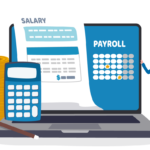When designing and reviewing your organization’s paid time off policy, it’s important to understand the distinctions between sick days and vacation days. Although some companies have a general, all-encompassing paid time off or “PTO” policy applying to both sick days and vacation days, there are definitely some benefits to keeping the two categories separate. Read on for our guide to the nuanced differences!
Sick Days versus Vacation Days:
What are Sick Days?
Employees use sick days to receive paid time off from work when they are too ill to come in, could spread their illness to others in the workplace if they came in or care for a family member who is ill.
If an employee is taking time off due to illness, employers are legally permitted to request a doctor’s note when the employee returns to work. Many companies, however, do not make a practice of requesting documentation unless an employee has missed three or more consecutive days from work.
What are Vacation Days?
Employees use vacation days to receive paid time off from work when they are away on holiday, take a personal day, or take time away from work for any other purpose, including attending appointments.
What’s the Difference between Sick and Vacation Days for Employers?
There are more legal protections for employees who take sick days versus employees who take vacation days. While employees are legally permitted to take sick days at any time, whether they are approved or not, vacation days can be allowed or disallowed by the company, depending on, for example, the dates an employee has requested paid time off.
Employees do not have to give notice to their employer if they contract a sudden illness. They cannot be punished or have promotions or other benefits withheld from them for taking sick days, whether pre-approved or not.
Do I Need to Differentiate between Sick Days versus Vacation Days for my Employees?
No, you don’t need to differentiate between sick days and vacation days for your employees. In fact, the growing trend is to offer a broad paid time off policy, where employees are allowed to take leave from work for a set number of hours. Typically, employers with these kinds of general PTO policies don’t require employees to disclose the reason for their requested leave periods.
However, you should be aware of your specific state’s laws regarding employee sick and vacation time. Some states enforce fairly specific regulations on PTO, which may be easier for some employers’ policies to differentiate between the two. It’s always a great idea to speak with a Human Resources Compliance Expert when making these kinds of decisions so that you can ensure total compliance with state laws.
Further, most states require employers with a PTO policy lumping sick and vacation days to pay accrued vacation time. Employers with separate sick and vacation day policies are generally not required to pay for accrued vacation time.
Crafting the Perfect PTO Policy:
Designing a compliant PTO policy that works for both your organization and its employees can be tricky for even the most experienced HR professions. Benely makes it easy. If your organization would benefit from access to certified HR experts, it’s time to contact Benely.






